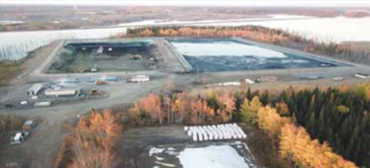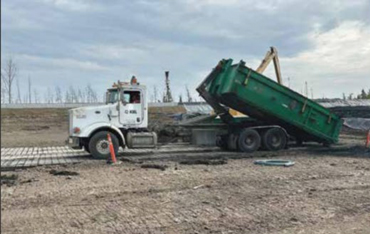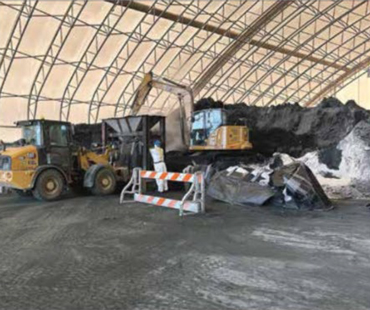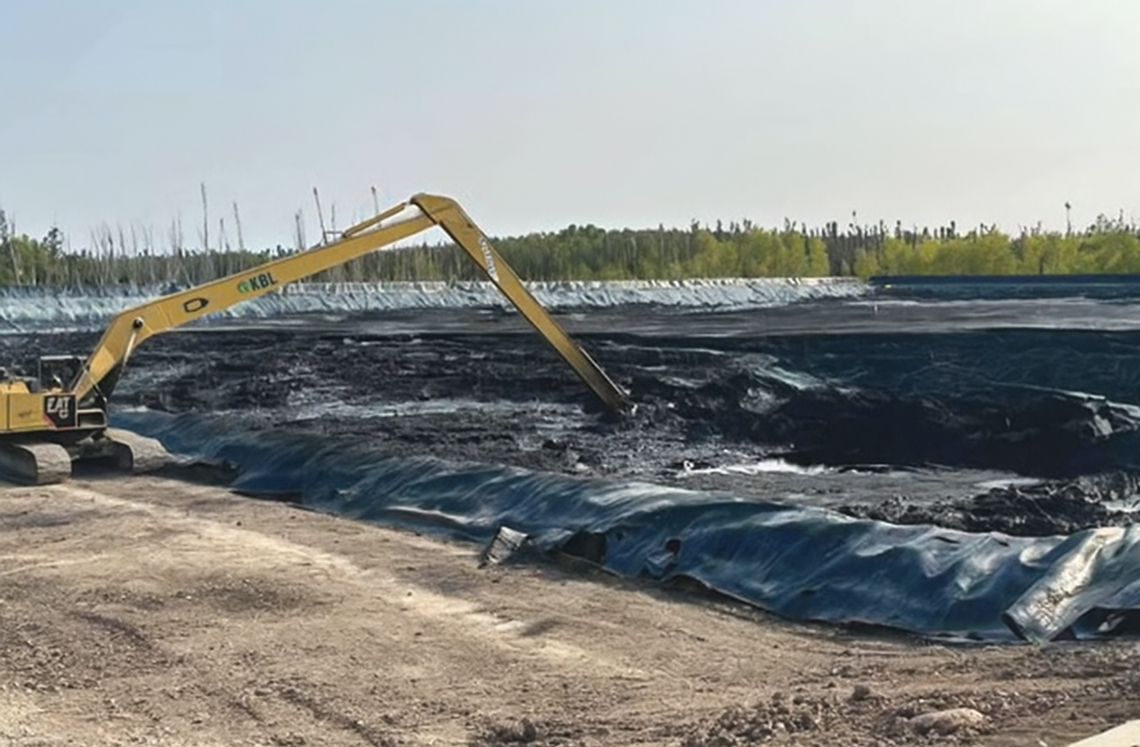| CLIENT | By Darryll Champagne, Regional Manager, KBL Projects Ltd. |
PROJECT PROFILE
In the summer of 2018, a major mining operation in Thompson, Manitoba, ceased all activities at its smelter and refinery. With the closure came a comprehensive decommissioning plan, which originally focused on a costly remediation program for the Refinery’s Copper Residue Holding Ponds. After months of collaboration between the mine owner and KBL Projects Ltd., KBL proposed an innovative approach: instead of remediating the site, why not reclaim the copper precipitate and bring value back to the operation as part of the closure program? Impressed by this forward-thinking vision, KBL was awarded the contract as Prime Contractor, responsible for overseeing all Environmental Construction, Procurement, and Contract Management (EPCM) requirements.
KBL brought its expertise in waste management, mining reclamation, and environmental sustainability to craft a plan that went be- yond traditional remediation. The new strategy focused on safely removing and treating the filtrate, extracting and neutralizing the copper precipitate, and transforming this waste into a marketable, shippable intermediate copper product. The project aimed to re- cover approximately 72,000 wet short tons (WST) of copper precipitate from the tailings ponds, effectively turning what had been considered a liability into a valuable resource. This marked a significant shift in how waste reclamation could be approached, offering the mine a profitable solution where only risks were once seen.
TRANSFORMING WASTE INTO VALUE
KBL’s reclamation efforts at the Thompson site, now extending into a third year, demonstrate the company’s commitment to transforming waste into value, aligned with the principles of the circular economy. By viewing waste as a potential resource, KBL turned what was once an environmental risk and financial liability into a valuable commodity. The copper precipitate, which had remained in holding ponds for years, was transformed into a marketable product through KBL’s innovative reclamation techniques. This approach not only mitigated environmental hazards but also generated a financial return for their clients with the project projected to be financially positive through three years of on-site processing and construction. It reflects KBL’s broader mission of finding unique, responsible, and sustainable ways to manage waste and environmental liabilities while setting new standards in environmental stewardship.
KBL is passionate about delivering solutions that support environ- mental, social, and governance (ESG) standards. The Thompson project is a prime example of this passion in action. KBL managed the entire lifecycle of the project, from decommissioning to reclamation, ensuring the safe extraction, treatment, neutralization, and transportation of materials. Their processes are rooted in environmental best practices, backed by a commitment to safety and operational excellence. KBL’s zero Lost Time Incidents (LTI) on the project further underscores their dedication to safety, integrity, and delivering top-quality service.
THE RESULTS
KBL’s success stems from their collaborative, client-centered approach, driven by a four-step process that they apply across all their projects: 1) we listen, 2) provide solutions, 3) service excellence, and 4) proactive communication.
KBL is currently in the process of completing year three of major operations at the site after an initial trial. The process begins with a complex sludge and water treatment program managing PH and reducing solids in the ponds through an onsite water treatment system. In the first two years of operation the group treated 31,335m3 of raw water producing 3,543 metric tonnes of filter cake and 500 metric tonnes of nickel.
Once water is removed, the extraction process begins. Through three seasons of pond bulk extraction, KBL has removed over 38,000 metric tonnes of material considered contaminated before going through the solids treatment process. This involved working in challenging northern environments with strict adherence to safety and environmental protection systems.
The processing of material is conducted in covered structures where the extracted material is chemically treated. Once the material is in an acceptable state the now marketable material is prepped and bagged for sale to various commodity markets. Over three seasons, the team has produced over 50,00 metric tonnes of copper and nickel precipitate for the client to sell.
Executing complex projects like the Thompson reclamation also requires a dedicated and highly trained team. KBL’s workforce brings years of expertise in environmental management and hazardous material handling to every project. Additionally, KBL emphasizes building strong relationships with local communities, stakeholders, and Indigenous groups, ensuring that their projects not only meet environmental goals but also positively impact the communities where they operate.
BUILDING ON SUCCESS
KBL’s achievements in Thompson are part of their larger mission to lead environmental remediation, reclamation, and sustainable development across Canada. Their work extends to remote and challenging locations, such as in the remote regions of Canada’s north. In each case, KBL’s innovative and practical solutions help clients manage environmental risks efficiently. The company specializes in services ranging from contaminated site remediation and facility decommissioning to hazardous material abatement, always aiming to provide cost-effective and sustainable methods for managing environmental risks.




